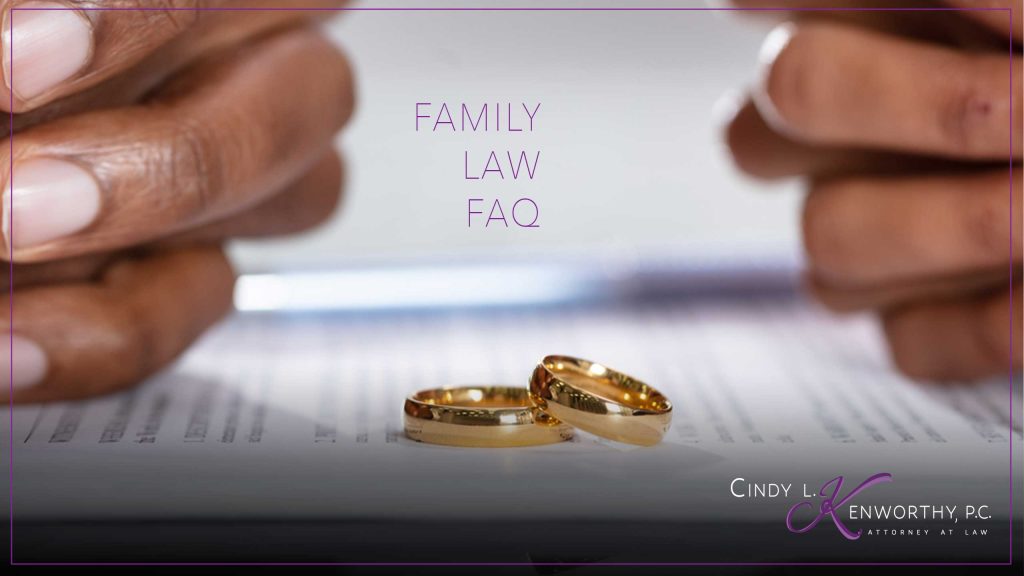Family Law FAQ
When you experience conflicts and legal problems in your family, you need to know your rights and find help to best resolve those problems. If you are contemplating a divorce, legal separation, child custody case, establishing paternity, or any other type of family law matter, contact a qualified and experienced family law attorney.
The following may help you in answering to common questions about family law. While this information will help you understand the basics, please consult an attorney for information related to your specific situation.
What is Family Law?
 Family law encompasses any legal issue related to family relationships including children, spouses, and family members. These cases should always be handled with care and compassion because they lead to major life changes and, of course, give rise to strong emotions, especially when children are involved.
Family law encompasses any legal issue related to family relationships including children, spouses, and family members. These cases should always be handled with care and compassion because they lead to major life changes and, of course, give rise to strong emotions, especially when children are involved.
Each decision in a family law case comes with legal, personal, and financial implications. Before choosing a lawyer to represent you, ensure they have the background and experience to handle the full range of your family law needs.
Family Law Cases We Can Help With
Child Support
In Indiana, divorced parents have a duty to provide support for their children and the state determines how much each parent must contribute. A family law attorney can help you navigate this process and understand your rights and responsibilities. It is important to recognize that a new Child Support Guideline will be issued by the Courts beginning January 1, 2024.
Sometimes, a paying parent or former partner may contest the fairness of a child support amount. With the passage of time, the child support amount may become unreasonable and factors like employment, income, and the child’s needs may need to be reviewed.
Because not everyone receives the same amount of income or pays the same amount for taxes or health insurance, not every parent pays the same percentage or dollar amount. There are many myths and misunderstandings surrounding how child support works in Indiana. If you feel that the child’s other parent isn’t paying their fair share, or if you have other questions about child support, our child support lawyer can help.
Child Custody
There are two main categories of child custody in Indiana: legal custody and physical custody. Broadly speaking, legal custody involves who has the right to make decisions on the child’s behalf while physical custody refers to where the child or children will be physically located. Custody can also be sole, meaning there is just one parent or guardian, or joint, meaning the parents share custody.
Determining who will have custody and how it should be handled is a very complex aspect of family law. Responsible parents, as well as the courts, place a high priority on maintaining safety and stability for children.
Changes in the living situation or other circumstances may impact how child custody is arranged. Noncustodial parents may have parenting time arrangements that need modification over time. You don’t have to handle these complicated situations on your own. A family law attorney can help.
Divorce/Dissolution of Marriage
Divorce is very often an extremely stressful and difficult time in someone’s life. In Indiana, divorce is technically termed “dissolution of marriage” and Indiana is a no-fault dissolution state, meaning there is no need for proof of adultery or any type of fault. The most common reason given is simply, “irretrievable breakdown.”
is very often an extremely stressful and difficult time in someone’s life. In Indiana, divorce is technically termed “dissolution of marriage” and Indiana is a no-fault dissolution state, meaning there is no need for proof of adultery or any type of fault. The most common reason given is simply, “irretrievable breakdown.”
Despite the widespread perception that divorce is on the rise, U.S. divorces are declining overall and hit a 50-year low in 2019. Indiana has a fairly high rate of divorce compared to other states and approximately 20 out of every 1,000 married Hoosiers will divorce each year.
Regardless of statistics and trends, divorce is a highly personal decision you should make in close consultation with an experienced divorce lawyer who can help you understand your options.
Legal Separation
Legal separation can be an option when you need time and space to decide what to do next. Seek legal representation so you understand your rights and options for what to do next.
Some couples use legal separation as a time to reconsider personal, religious, or financial conflicts. A legal separation in Indiana lasts just one year, which can pass quickly when you are struggling with difficult circumstances. Either party can end the legal separation prior to its one year expiration by filing for divorce.
Mediation
Not all family law cases are handled in courtrooms. Mediation is a form of alternative dispute resolution. In other words, it is a way of settling family law matters with, hopefully a minimum of contentiousness. Almost all courts that hear family law cases require parties to participate in mediation before a final hearing will be scheduled.
No agreement is required as an outcome of mediation, although a formal agreement may occur. Work with your family law attorney to determine whether mediation is a good fit for your situation.
Paternity
Indiana presumes that when parents are married, or if the baby is born no more than 300 days after the marriage ends, the husband is the biological father. If paternity is in question, or if the parents are unmarried, the situation may become more complicated.
A family law attorney can help you with issues related to establishing paternity, custody, child support, parenting time schedules, insurance coverage, and more. Establishing paternity may involve a legal document known as a paternity affidavit, where a father may acknowledge that he is a child’s biological father.
Same-Sex Divorce and Family Law
A landmark U.S. Supreme Court decision in 2015 established rights for same-sex couples. Marriage between same-gender people is legal in Indiana. LGBTQ family law is a complex aspect of the law, so make sure your family law attorney has the expertise it takes to handle a case involving a same-sex marriage.

What Does a Family Law Attorney Do?
 A family law attorney focuses on topics like domestic relationships, marriages, divorces, child custody, and child support. During times of intense interpersonal conflict, family law attorneys provide legal insights and educate their clients on their rights and options.
A family law attorney focuses on topics like domestic relationships, marriages, divorces, child custody, and child support. During times of intense interpersonal conflict, family law attorneys provide legal insights and educate their clients on their rights and options.
In Indiana, a family law attorney can help you understand issues specific to the state, like Indiana’s no-fault divorce, spousal support, and child custody laws. Your lawyer can help you anticipate how the legal process may unfold, assist you with meeting legal deadlines, and work to ensure your voice is heard during the process.
What Are the Stages of a Family Law Case?
Each family law case follows a unique path depending on the type of case and its specific circumstances. Broadly speaking, many family law cases tend to progress through the following stages.
Stage 1: Learn How Indiana Law May Impact Your Situation
An initial meeting with a family law attorney may provide you with information to help you decide how best to move forward.
Stage 2: Filing/Petition
The second step is for the family law attorney to draft a petition and submitting it to the court, plus paying a filing fee. The person who files the petition is known as the Petitioner and the other person is the Respondent. In some cases with violence, threats, or emergency needs, this step may be immediately followed by the issuance of a protective order.
Stage 3: Service
This step officially notifies the Respondent about the filing and coming proceedings. If the Respondent refuses or avoids service, work with your family law attorney to address the situation.
Stage 4: Temporary Orders and Hearings
In many cases, a temporary order of is issued and provides for actions such as temporary child custody. These orders usually involve providing evidence and explanations to the court, so you should seek the help of a family lawyer to best handle this step.
Stage 5: Discovery
The parties provide to their attorneys information like bank statements, pay stubs, insurance information, and more. This stage can be challenging for someone whose life is already in a state of upheaval. Responding to discovery is not optional. The more complex the legal and financial circumstances, the longer and more complicated this stage will be. Heated disagreements can also be challenging during this phase, but your lawyer can help you navigate the process.
Stage 6: Final Hearing and Entry of Order
Barring an appeal, a family law matter is not final until the final hearing or trial has occurred and the judge has entered a final order in the case. This stage concludes the case and the Order is the law of the case.
How Can a Family Law Attorney Help?
 When you are in crisis or need to make plans for the future, a family law attorney can help you understand your options and rights. Your lawyer can help you learn more about legal concepts, preparation of documents and court filings, negotiate with the other side, collect necessary evidence, meet deadlines, and represent you in court.
When you are in crisis or need to make plans for the future, a family law attorney can help you understand your options and rights. Your lawyer can help you learn more about legal concepts, preparation of documents and court filings, negotiate with the other side, collect necessary evidence, meet deadlines, and represent you in court.
Speaking to a lawyer doesn’t necessarily mean you must start a legal case or go to court. Often, people decide to meet with family lawyers to educate themselves and feel more empowered.
Perhaps you’re trying to make an important decision that could impact your family and children. A family lawyer could provide key insights about the law and inform you of common mistakes so you can evaluate your best options for your situation.
What Should I Bring to the First Meeting With a Family Law Attorney?
 At your first meeting, your lawyer will focus on getting to know you and understanding your needs. They will provide basic information about your situation and how it relates to the law and look over any materials you have related to your case.
At your first meeting, your lawyer will focus on getting to know you and understanding your needs. They will provide basic information about your situation and how it relates to the law and look over any materials you have related to your case.
Bring the following things to your first meeting, at a minimum: any paperwork you’ve received from the court or another party, and other materials that pertain to your case. If you have a pre-existing child custody agreement, divorce, or similar family law matter, bring documentation related to that case.
You don’t necessarily need to bring old financial paperwork, like pay stubs and tax returns from years ago, until a later meeting when you are preparing for the next stages in the process. However, you should always bring any financial, legal, or other documents the attorney has specifically asked to see. This helps you and your attorney get the most out of your initial meeting.
Need to Know More About Family Law? Contact Cindy L. Kenworthy, P.C.
Cindy L. Kenworthy, P.C. understands that legal issues regarding you and your family can be deeply emotional. You deserve competent and compassionate legal representation from an experienced family law attorney.
Choose Cindy L. Kenworthy, P.C. and gain a partner in the process. I’ll bring my expertise, dedication, and discretion to your family law case. Contact me today at 317-516-0515.

